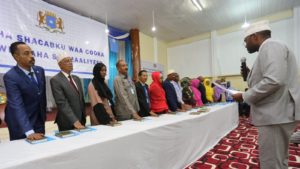- Stay Connected
Two-thirds of Somalia’s presidential candidates hold foreign passports

After an arduous electioneering process marred with corruption, vote-buying, and delays, Somalia will finally hold its presidential elections on Wednesday (Feb. 8). Given the ethnic nature of Somalia’s voting system, lawmakers, elected through clan delegations instead of universal suffrage, will vote for the country’s next president.
One key feature unites some parliamentarians and the majority of presidential candidates: many hold foreign passports. More than 100 of the country’s 275 legislators hold foreign passports according to Wakiil, an online initiative that promotes accountability by documenting the electoral process.
And out of the 24 candidates cleared to run for the country’s top office (one dropped out this week), 16 of them have foreign passports. This reportedly includes both the current president Hassan Sheikh Mohamud and his immediate predecessor Sheikh Sharif Sheikh Ahmed, both of whom have Kenyan passports and are running for president.
As long as the candidate is a Somali citizen and Muslim, Somalia’s constitution (p. 28) doesn’t specify much about foreign passport holders, and whether or not they are eligible to run for president. A previous charter (p. 21) stated that the president should not be married to a foreigner and not marry a foreigner during his term in office. Despite the ambiguity on holding foreign passports, Abdihakim Ainte, a political analyst, says that the consensus is that once elected, a president should rescind his foreign passport.
Yet being a “Somali citizen” can be an open-ended matter, given that it can be both from your ethnic group or nationality. Thus, as long as one was born in Somalia, and their father can trace his lineage into one of the Somali clans, what passport they hold can be a non-issue when running for office.
The large numbers of foreign passport holders is also a testament to the conflagration of Somalia. Almost 2 million Somalis live outside the country, while hundreds of thousands were granted asylum in western countries since the civil war began in 1991. Many of those in the diaspora are now coming back, joining the government and private sector at various capacities, and using their expertise and resources to benefit the country.
But tensions have existed between the local and diaspora Somalis, the latter of whom are seen as returning to the country to take advantage of these new opportunities. Perceptions that they maintain a sense of superiority and do not have meaningful interactions with locals have also persisted, according to a report from the Heritage Institute for Policy Studies, Somalia’s first think tank.
In this election cycle, many Somalis are also questioning the patriotism of these foreign passport holders says Ainte. Even though he doubts their dual nationalities will have much of an impact on serving the Somali people, it raises, he says, “legitimate questions of the authenticity of their patriotism and their allegiance to the country.”
Donald Trump’s ban on Somalis notwithstanding, holding a Somali passport presents its own difficulties. The Somali passport is the lowest ranked African passport, with visa free travel to only 30 countries in the world.
Both the United States and the United Kingdom governments have in the past warned their dual Somali citizens from engaging in illegal activities during the election process.

76 Responses to Two-thirds of Somalia’s presidential candidates hold foreign passports